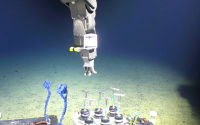Antibiotics from the Abyss
- Date
- 14 Oct 2025
- Start time
- 7:00 PM
- Venue
- Tempest Anderson Hall
- Speaker
- Dr Kate Duncan, University of Newcastle

Antibiotics from the Abyss
Dr Katherine Duncan, Senior Lecturer, University of Newcastle
Since the discovery of penicillin in 1928, microbial chemistry has revolutionised public health. In fact, most of antibiotics (tetracyclines, aminoglycosides etc) in clinically use were discovered in the ‘golden age of antibiotic discovery’ (1920s-1970s). In the arms race of microbial evolution and our ability to discover new chemistry, the microbes are winning. By 2050, 10 million deaths will be attributed to antimicrobial resistance (AMR). These talented strains are constantly adapting strategies to become resistant to antibiotics, becoming multi-drug resistant and even sometimes termed ‘superbugs’. In the last 50 years, there were various strategies to antibiotic discovery, the main one was making them synthetically in the lab.
Despite the promise, only 4-6 antibiotic classes were discovered with many of the approved drugs being modifications of existing chemistry. It was concluded that nature is a better chemist that we are, and as such strategies to uncover new chemistry include looking in underexplored places, studying rare bacteria and using new methods and technology. Our work focusses on learning what influences the ‘chemical language’ of bacteria – as this is poorly understood. Is it abiotic parameters such as temperature, salinity and pressure or is it biotic factors like microbial community. To do this we look at rare actinomycetes (bacteria) from understudied locations, including Antarctica and the deep sea <4000m. By learning from nature, we will likely unlock secrets as to why chemistry is produced and accelerate antibiotic discovery.
7pm in the Tempest Anderson Lecture Theatre in the Yorkshire Museum on Tuesday 14th October.
YPS Members and students free; non members £5.
Member’s report
Dr Duncan started her talk by telling us that antibiotics have been in existence for almost 100 years – 1928 being the year of Penicillin’s discovery. The number of antibiotics now number in the 100s to 1000s. However, antibiotics can be grouped into classes, and the number of classes is in the range of 12-15. Each class has a different mechanism of targeting and killing bacteria. Antibiotic resistance is of growing concern, and a bacterium that develops resistance in an antibiotic, might develop resistance against an entire class of antibiotics rather than just focussing on a single antibiotic.
While the 1940s to the 1970s were the golden age of antibiotic discovery, since the 1970s onward there has been a “discovery void”. Antibiotics that have been synthesised by chemists have been largely unsuccessful. The era of Anti-Microbial Resistance (AMR) is now. Currently about 7×105 people die from AMR bacteria each year. It is estimated that this figure will grow to 10×106 by 2050. So we are now in an arms race of AMR discovery. 70% of antibacterial agents are from natural products, so nature is a much better chemist than we are. Dr Duncan is researching a type of bacterium called Actinomycetes, which are largely untouched as a source of antibacterial agents. Actinomycetes form less than 1% of a microbial community, though often detected by us as the source of the wet earth smell after rain. Actinomycetes from the deep ocean are being brought to the surface by obtaining sediment samples. In a recent study 5,578 species were found, 88 to 92 % of which had never been seen before.
Genome sequencing is being used to find Biosynthetic Gene Clusters (BGCs). These BGCs can be used to find chemical fingerprints that could lead to new antibiotic agents. Mass spectrometry is being used to identify new compounds and find how different species are related to each other. The new species have a low similarity to things that have been found before. Going to a new environment leads to new biology which leads to new biosynthetic diversity which leads to new chemistry. Dr Duncan’s talk was very well received with many questions posed by the audience.
Chris Walker